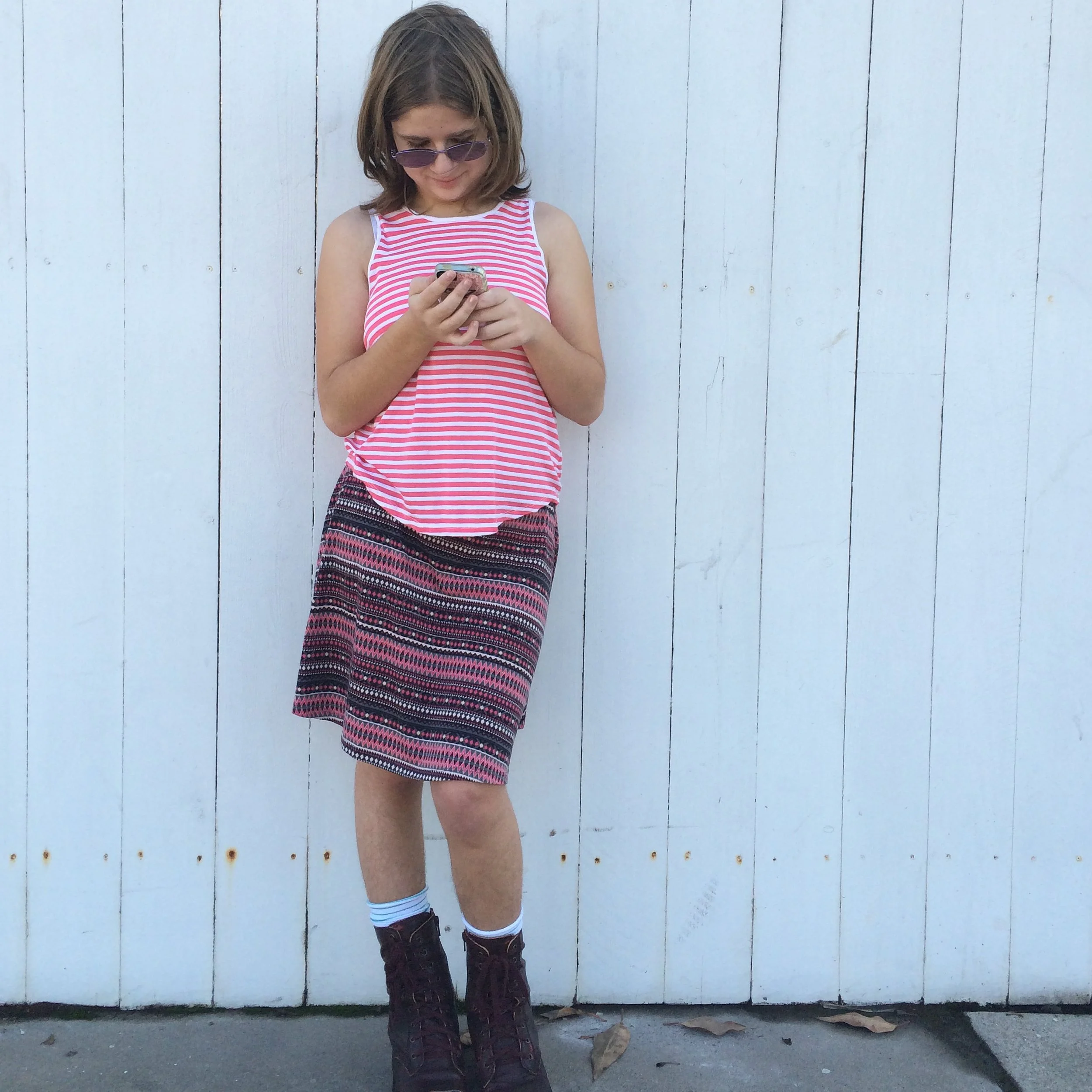Moms Everywhere...You Kinda Got A Point.
7/9/18
About the phone thing.
About the addiction (it is addicting, certainly feels that way, no matter what Slate article you've read), and the human intelligence buffer it seems to present.
But before you say anything, let me tell you, I came to these conclusions on my own. You were only one part of this.
I will first give you a bit of history on the subject on phones as they are now, so we feel better and slightly more prepared to talk about this.
The first rotary dial, as they are called, was patented in 1896 by three gentlemen; John Erickson, Charles Erickson, and their partner A.E Keith, who all, in turn, worked for a man named Almon Brown Strowger. In 1919, the first of these phones hit the market. Since then, multiple companies took their turn with the gadget, including the company whose namesake was the Alexander Graham Bell:
Not too much development took place with the objects themselves until years later, just minor changes to shape and form. In 1946, the first commercial mobile phone service was introduced. Twas a car phone, and it worked by linking cars to telephone systems via radio waves.
But while radio waves, cell service, and the micro technologies helping them along were improving day by day, Hedy Lamarr, the famous actress and scientist, along with a fellow named George Antheil, invented something responsible for your love/hate relationship with your phone's functionality - together, they co-created something called spread-spectrum radio, which is viewed as a mother to our current Wifi.
There's a bit of a details gap on most of these timelines, for the simple fact that 1980's-now there was so much change that the technologies that were introduced during this time - remember pagers? - rarely lasted more than a generation, and I doubt many people were willing to analyze something so temporary. Also I'm lazy. (You try looking this stuff up and finding anything that makes sense. And hey, I didn't say this was going to be a comprehensive history of the phone.)
Now, let's begin the discussion.
What I will say is that "smartphone addiction" (which is according to Slate, code for: enticing, bad habits) as a term, surfaced in 2012, when - ironically - Google searches for that term began skyrocketing. So it's clear that new technology doesn't always pair with the "Oooh! Shiny!" instinct immediately. So where does it come from?
I'd say it's the stuff on the phones. We, as people, like convenience and easy wins. Video games are an entire other topic, but I'll visit it real quick to say: it sure feels good to play a game like Candy Crush or Gardenscapes, because you swipe, use a few good tricks, maybe even spend money, and then - seemingly by magic - you earn a reward! "What? That was nothing!...I can earn rewards by doing nothing??" If you swear this isn't your thought process, your brain might disagree with you. And Facebook, let's think about Facebook, Instagram, and Twitter.
Facebook had that whole issue a few months back with privacy, but that is surprisingly not my main issue. Those adults that aren't on Instagram with their kids, and are afraid of Snapchat (why?), are thereby on Facebook - the place where you go for news and stay for...what? I'm not on Facebook, but I know that my mom checks her phone at least as much as I do and that is where. Let's say you're really on there for news. Are you going to get just that, or faux facts?
On Facebook, anything that looks like an article - even with fake sources or none at all - can get traction. Do you care enough to check what you're seeing? I'm going to go ahead and answer "no" on your behalf. That's not your problem - or your fault - but it is a problem. Which is why you try to avoid unverified sites by following the big sites (like the New York Times and Slate for instance), your friends, and their Friends. But you can't control who they follow. If your friends like your friend's Friend's liked posts, you see them. So you trust in your friends. But there's no way to trust their sources, however much you trust them personally. Unless you care enough to check. So it's a bit of a loop you're in. I get you. Another way that Facebook is like the adult's Instagram, is: I've spent 7.7 hours on Instagram this week. My mother - my chosen guinea pig - has spent 7.4 hours on the Facebook app this week. Facebook was clearly made to be addictive.
Instagram is addictive for two reasons. 1, the explore page, and 2, your friends. The explore page is so hard to get out of, I will spend hours there and on Pinterest combined, because it's "image, that's nice, image, that's nice, scroll, look, like, scroll, look, like." It's the "Oooh, pretty!" brand of the "Oooh, shiny!" instinct. I've tried saying to myself, "no more exploring." Never works. I feel as though it's beyond my own will. And you want to see what your friends (and celebrities) are doing, right? So you check, and...slowly...drift...away.
I was on Twitter for a short spell. No longer am. (I lied to my parents about getting one...after they said no. Ah, to be an adult.) I might be back in a few months, for blog-related sharing only, or a few years. From my time there, I have to admit, I agree with those who say Twitter just isn't Instagram or Facebook, so they can't use one in the place of the other. It has a very distinct feel, even if the same people follow you everywhere. Twitter is a callous place (Trump's favorite!), and a manipulative tool. I found myself checking it more than Instagram when I had one. There's a similar danger with every site, really, of not being able to verify sources properly. On Twitter, people take that and run. You will find people willing to defend-to-the-death something that isn't true. I'm not able to pull up any examples (I respect my parents' wishes and have not gone on Twitter since they found I had one and made me delete it - I sound like a great child, don't I?), but if you've been on Twitter at all, you get the gist.
But - and I'm about to contradict one of my own previous statements - how can it be what's on the phones if it's the phones themselves we carry around all day? Think about it. When you're done on one app, you go to the next. And the next. And the next. When you're done on one game, you go to another, then Pinterest, then Facebook, then texting, then then email, then...The rectangle itself can't seem to get enough attention. And you can't seem to let it go. We already reviewed dopamine, in one of the articles I linked to, and how powerful it is. Brain happy = body keep doing the thing. It's almost as though it's the devices themselves that addict us, and the apps and games are just excuses to hang on to them.
What are we willing to give up?
And: What have we given up by gaining this technology?
For starters, allow me, as a fellow "gen z" kid, to point something out I find absolutely ridiculous. The walking-while-looking-at-phone most everybody in my generation and older (millennials!) seems to do. I am around the age where I should think it's fine, and maybe it's just because I'm disabled and have trouble with balance and walking support, but I think it so dumb. For two reasons:
1. How are you doing that? Literally - walking down and up stairs, in the street, in crowds...how are you not dead? How have you not tripped? (Or, right, cause you're "lucky.") Are you secretly seeing through your phone? Maybe you think you know better than to get hit (wow, you say, dying is so stupid!). I've got news for you, bud. "Bottom line: Texting while walking is especially risky in urban environments. Combine that with drivers who are using their phones or touchscreens while driving, and it's a recipe for fatalities...'It’s downright disturbing,' said Richard Retting, director of safety for Sam Schwartz Consulting, who authored the report for GHSA. 'People outside cars are dying at levels we haven't seen in 25 years.'" - USA Today. There was one time I remember, I was walking out of the bathroom, my sister was heading in, and she literally walked into me because she wasn't looking at me. She was on her phone. I was right in front of her. Forgivable? Yes. Worrying? Yes. (At least I didn't get hit by a car.)
2. You're missing out. On murals, trees, good views for a photo, guerrilla art, strange statues...you walk by. You are, quite simply, missing out.
And, as we all know, with "positive" progress in technology comes "positive" progress in society. *sad laughter from audience* As I said a while ago, in the car with my mother one time, "we've gotten to the point where we can heat our butts but not warm our hearts."
My point is this: we have technologically ventured to the point where there are seat warmers in our cars, which in 1946 barely contained a car phone (and a pretty chunky one, I'd imagine), yet:
1. Child and teen shooting survivors are getting called "crisis actors."
2. Our Id is currently putting children from below our Southern border in brutal situations. Border Buddies should be Border Buddies, not Border Bitches.
3. In the worst parts of America, views of people of color haven't changed since the Civil War.
4. Most people from the United States speak one language, and it is "American."
I'm starting to think we should take a break from trying to further technology (we can still have it around, though), and start furthering ourselves.
There's a lot to figure out. I don't want to give up Instagram entirely, and like everyone else, I would hate it (for at least a week) if the apocalypse came and all our phone/computer-related technology was no longer functional (how would I have a blog, then?), and I admit that humans have been trying to understand what makes us tick and how to make us kinder and more efficient for a while and we've gone the way we have all the same. But whatever we end up doing in the future, however we end up conversing, making art, reading, I hope we figure something out.
I hope that whatever we do, we do exactly what is good for us.



